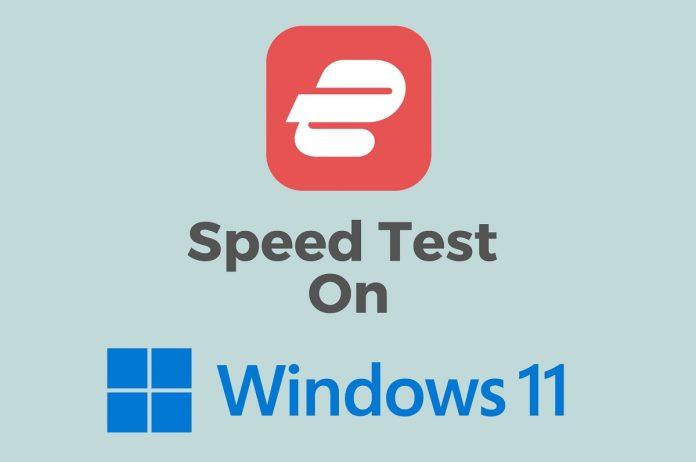In the dense forest of Virtual Private Networks (VPNs), numerous providers flaunt their thousands of servers. For example, NordVPN, a notable name in the industry, boasts over 5700 servers worldwide, and Surfshark VPN spans its network across 100+ countries. However, it’s crucial to understand that not all servers perform the same. Your connection speed can differ based on server distance, load, and the server quality itself. This diversity prompts us to explore how ExpressVPN, one of the industry’s front-runners, performs in terms of speed across its major servers.
But why is it important to know the speeds on different servers? Whether you’re a globe-trotting digital nomad accessing files back home, a cinephile streaming foreign films, or a gamer playing on international servers, VPN speed matters. If a VPN server is slow, it can result in frustrating lag or buffering. Knowing which servers perform best helps you enjoy a smoother online experience, regardless of your online activity. Hence, we’re putting ExpressVPN to the test.
About ExpressVPN
ExpressVPN, a highly recognized name in the realm of VPN services, deserves a deeper look to truly understand its features, benefits, and overall performance. Let’s delve into its various facets:
Roots and Jurisdiction
Established in 2009, ExpressVPN finds its roots in the British Virgin Islands, a locale known for stringent privacy laws, thus providing an added layer of data protection. This location, outside the jurisdiction of 14-Eyes countries, means that ExpressVPN is not legally obliged to keep user activity logs or share them with international government agencies.
The Privacy Promise
ExpressVPN has built its reputation on the foundation of user privacy. It implements a strict no-logs policy, which means it doesn’t keep any records of your online activity. This commitment is backed by an independent audit by PwC, which verified ExpressVPN’s compliance with its privacy policy.
Robust Security
ExpressVPN’s security is like a digital fortress. It employs AES-256 encryption – the same standard used by governments and security experts worldwide to protect classified information. This, combined with features like DNS leak protection, automatic kill switch (Network Lock), and split tunneling, helps maintain a secure and stable connection.
Expansive Server Network
Boasting a network of over 3000 servers spread across 94 countries, ExpressVPN offers a global connectivity footprint. This wide coverage allows users to bypass geo-restrictions and access content from around the world with ease.
Speed and Performance
Revered for its speed, ExpressVPN continually tops speed test charts, providing users with fast and consistent connections, crucial for buffering-free streaming, seamless gaming, and quick downloads.
User-Friendly Apps
ExpressVPN offers intuitive and user-friendly applications for a variety of platforms, including Windows, macOS, Android, iOS, and more. The apps offer a clean and straightforward interface, making it easy even for VPN beginners to connect to their desired server.
24/7 Customer Support
The importance of reliable customer support in a VPN service cannot be understated. ExpressVPN provides round-the-clock support via live chat and email. Their support team is knowledgeable and quick to respond, ensuring user queries and issues are addressed efficiently.
Price and Money-Back Guarantee
ExpressVPN offers several subscription plans to cater to different user needs. Although it’s not the cheapest VPN on the market, the quality of service and features offered do justify the cost. Plus, ExpressVPN backs its services with a 30-day money-back guarantee, allowing users to test the service risk-free.
By providing a comprehensive suite of features alongside a robust commitment to privacy and security, ExpressVPN has carved out a strong presence in the VPN market. It’s more than just a VPN service; it’s a tool geared toward promoting a freer and safer internet experience.
Testing Methodology
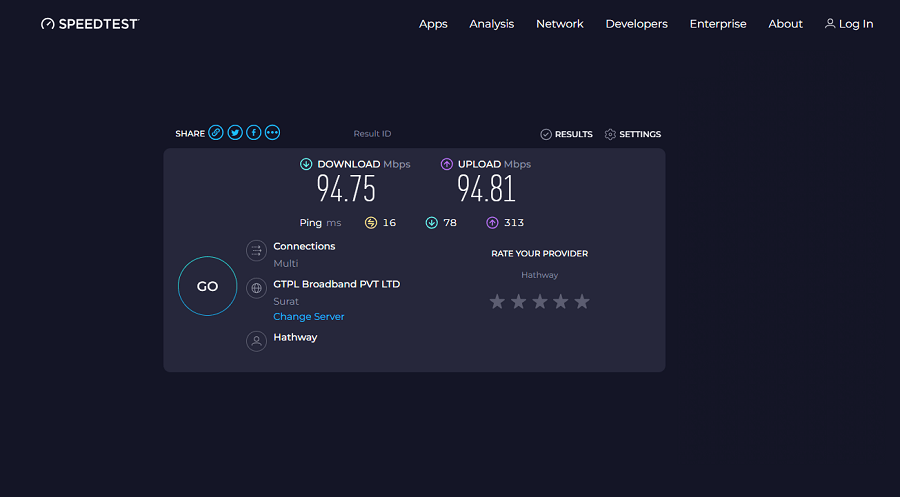
Our quest to evaluate the ExpressVPN speed test on Windows takes place from our home location in India, with a base download speed of 94.75 Mbps and an upload speed of 94.81 Mbps. By carrying out these tests from a singular location, we aim to replicate the user experience of a typical VPN user connecting to diverse international servers.
The specific servers we’ve selected for this test are spread across key geographic areas. We believe this selection will provide a comprehensive view of the ExpressVPN speed test on Windows across various network conditions and distances.
Our chosen servers are:
- United States (New York): A hotspot for content streaming and gaming activities, these servers will help us evaluate performance under high-demand conditions.
- United Kingdom (London): As a key hub for European connectivity, this server will give us insights into accessing region-specific content.
- Canada (Toronto): This helps represent the performance for users in North America.
- Australia (Sydney): Chosen to evaluate connectivity in the Oceania region and to observe speed performance when connecting to a server that is geographically distant from our testing location.
- Germany (Frankfurt): This server represents Central Europe’s connectivity, which is crucial for users in that region.
- Japan (Tokyo): A great way to gauge performance in East Asia, a region known for high internet speeds.
- Singapore: As a popular choice for users in South-East Asia, testing this server helps evaluate performance in a nearby region.
- Brazil (Sao Paulo): This server will represent connectivity conditions in South America.
- South Africa (Johannesburg): A vital location for users in Africa.
- India (Mumbai): Testing a local server will provide insights into how well ExpressVPN performs when connecting to a server in the user’s own country.
- Egypt: With its rigorous internet regulations, testing the Egyptian server will provide a unique perspective on ExpressVPN’s performance in a heavily regulated environment.
- South Korea (Seoul): Known for having one of the fastest internet speeds globally, testing this server will provide insights into ExpressVPN’s performance under optimal conditions.
The test bed for this ExpressVPN speed test on Windows evaluation is used by a Windows 11 PC with the following specifications:
- Processor: Intel Core i7-11700K 3.6 GHz 8-Core Processor
- RAM: Corsair Vengeance LPX 16 GB (2 x 8 GB) DDR4-3200 CL16 Memory
- Network Adapter: TP-Link Archer TX3000E PCI Express x1 802.11a/b/g/n/ac/ax Wi-Fi Adapter
In our tests, the VPN protocol is set to ‘Automatic,’ thereby allowing ExpressVPN to choose the most effective protocol for each server connection. To establish a baseline for comparison, we measured the speed of our internet connection without the VPN activated.
This methodology, we believe, will offer a balanced and accurate evaluation of ExpressVPN’s speed performance across diverse server locations and network conditions.
United States (New York)

While connected to the New York server, we managed a smooth Skype video call to a friend on the East Coast, with minor lag despite the high-resolution video – the digital divide was almost unnoticeable, and the download speed of 67.4 Mbps and the upload speed was 80.67 Mbps which allowed us to comfortably stream a live NBA game in 4K on ESPN without buffering issues, much like we were watching it directly from a cable TV broadcast. The drop percentage for download speed is approximately 28.88%, and the drop percentage for upload speed is approximately 14.91%.
United Kingdom (London)

Using the London server, we could stream a Sherlock episode on BBC iPlayer in HD without interruption. The download speed of 70.27 Mbps and the upload speed of 88.92 proved sufficient even for the high-detail scenes, making it seem as if we were watching it directly from a local UK network. The drop percentage for download speed is approximately 25.82%, and the drop percentage for upload speed is approximately 6.20%.
Canada (Toronto)
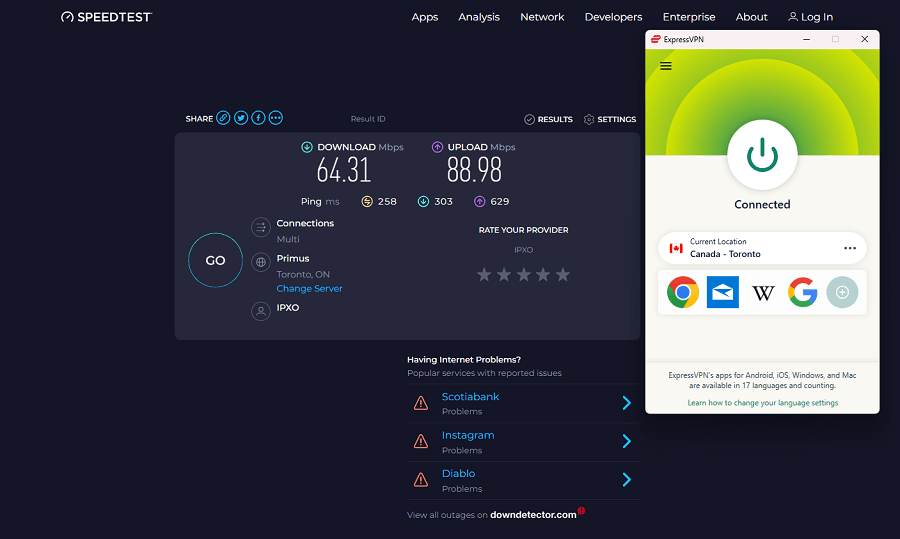
The Toronto server offered a download speed of 64.31 Mbps and an upload speed of 88.98 Mbps. During our test, we streamed a live CBC news broadcast without hitches, while our 1GB file upload to Google Drive was completed faster than anticipated. The drop percentage for download speed is approximately 32.11%, and the drop percentage for upload speed is about 6.15%.
Australia (Sydney)
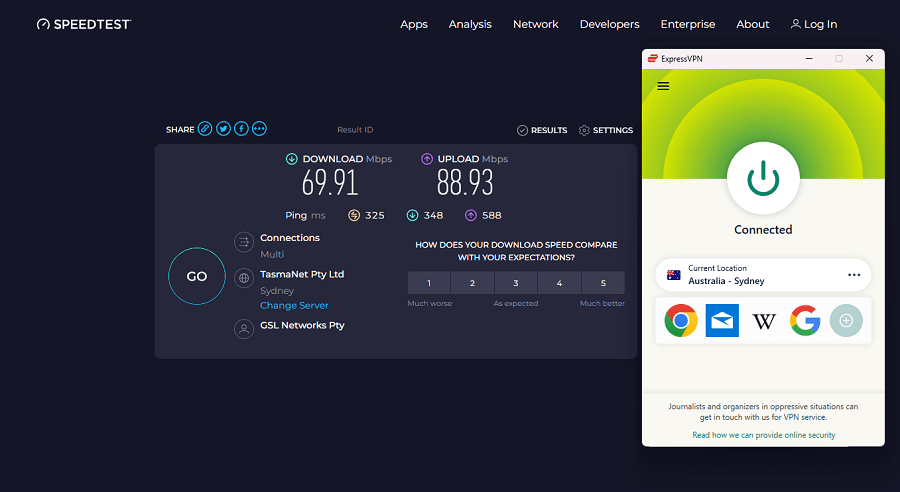
Despite the geographic distance, the Sydney server managed a download speed of 69.91 Mbps and an upload speed of 88.93 Mbps. This was enough to let us binge-watch a season of Miss Fisher’s Murder Mysteries on ABC iview without interruptions, almost feeling like we were enjoying the show from down under. The drop percentage for the download speed is approximately 26.16%, and the drop percentage for the upload speed is around 6.21%.
Germany (Frankfurt)
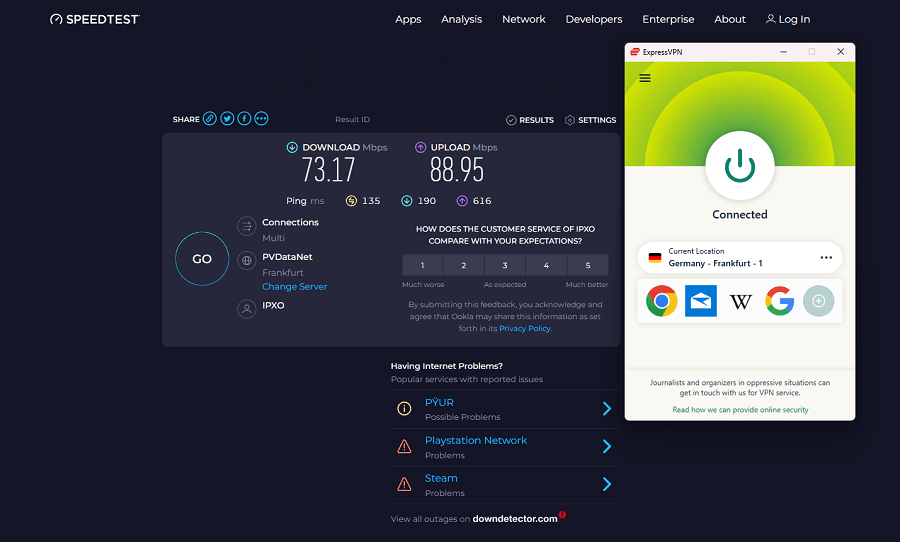
Using the Frankfurt server, with a download speed of 73.17 Mbps and an upload speed of 88.95 Mbps, we could watch a Bundesliga match live on Sky Go De without any noticeable lag or quality degradation. The high-speed action was rendered seamlessly, giving us an almost in-stadium experience. The drop percentage for download speed is approximately 22.77%, and the drop percentage for upload speed is about 6.17%.
Japan (Tokyo)
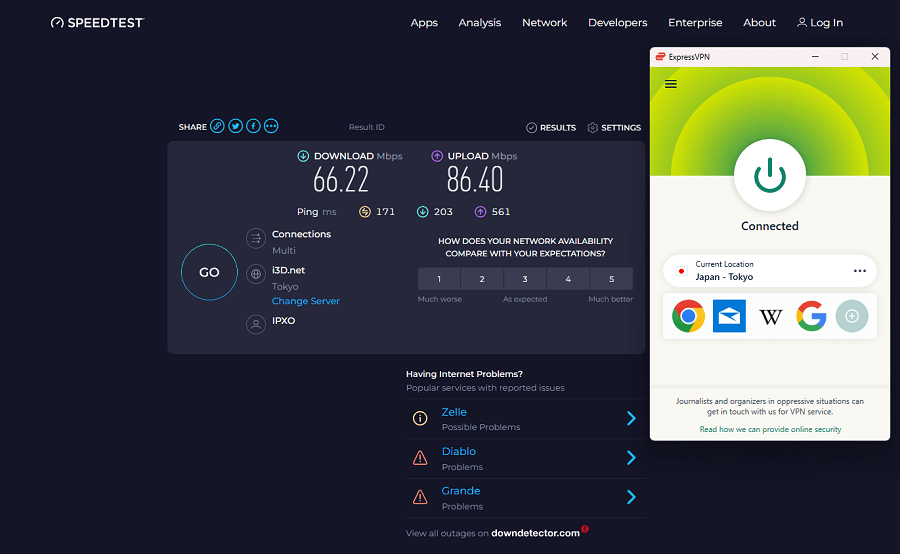
While connected to the Tokyo server, we experienced a download speed of 66.22 Mbps and an upload speed of 86.40 Mbps. This allowed us to stream a full-length anime episode on Netflix Japan without any buffering, making the viewing experience as flawless as if we were in Tokyo itself. The drop percentage for download speed is approximately 30.10%, and the drop percentage for upload speed is approximately 8.86%.
Singapore

With the Singapore server being closer to our test location and delivering a high download speed of 82.84 Mbps and an upload speed of 88.82 Mbps, we were able to enjoy an HD movie on meWATCH. The high-speed streaming was a smooth sailing experience, replicating the efficiency for which Singapore is renowned. The drop percentage for download speed is approximately 12.57%, and the drop percentage for upload speed is around 6.32%.
Brazil (Sao Paulo)
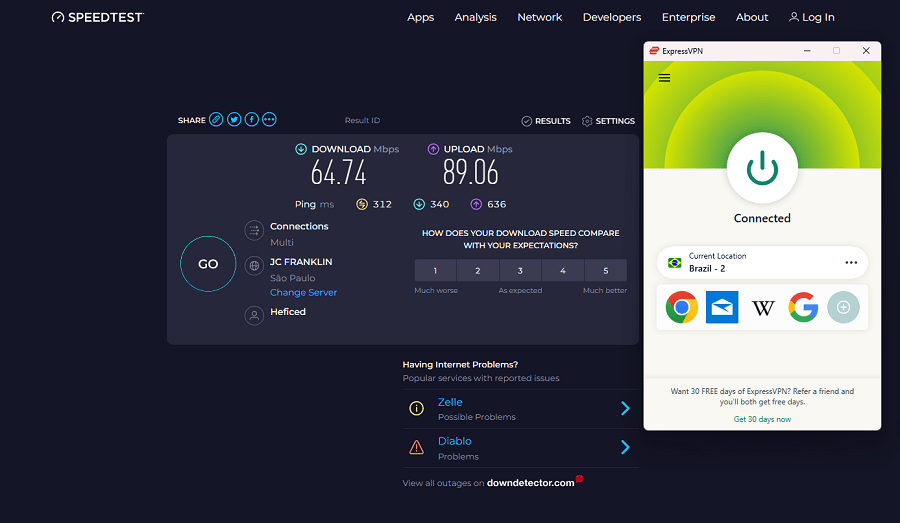
Connected to the Sao Paulo server, which offered a download speed of 64.74 Mbps and an upload speed of 89.06 Mbps, we watched a live football match on SporTV. The streaming quality was high enough to capture the intense action on the pitch, virtually transporting us to the lively stadiums of Brazil. The drop percentage for download speed is approximately 31.70%, and the drop percentage for upload speed is approximately 6.05%.
South Africa (Johannesburg)

Despite Johannesburg being one of the farthest servers from our location, it managed to deliver a respectable download speed of 65.84 Mbps and an upload speed of 65.26 Mbps. This was enough to let us stream a wildlife documentary on DStv Now with only minor buffering, making us feel closer to the African wilderness. The drop percentage for download speed is approximately 30.47%, and the drop percentage for upload speed is about 31.10%.
India (Mumbai)
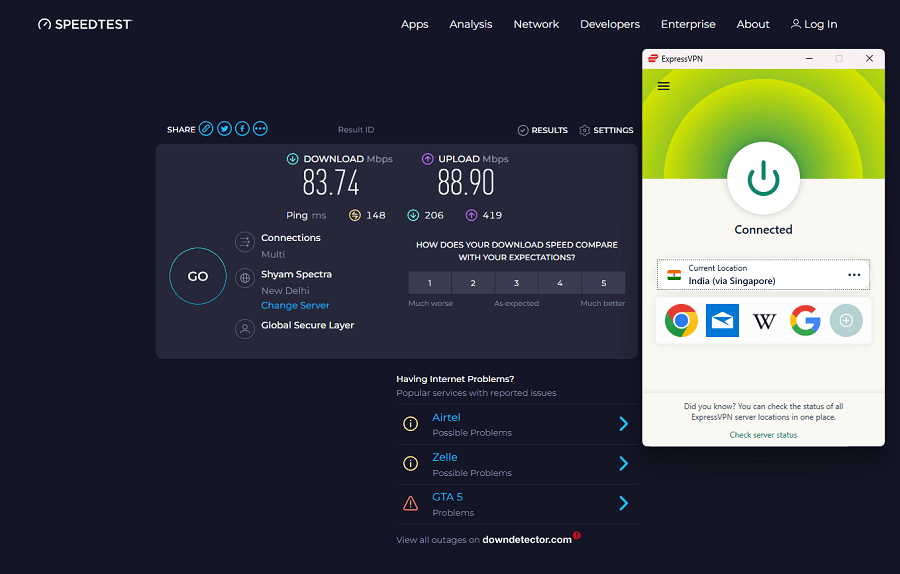
The Mumbai server, being our local connection, delivered the fastest speeds – 83.74 Mbps (download) and 88.90 Mbps (upload). This enabled us to stream a live cricket match on Hotstar in HD with no lag, making us feel as if we were watching it directly from the stadium. The drop percentage for download speed is approximately 11.61%, and the drop percentage for upload speed is approximately 6.23%.
Egypt

The Egyptian server offered a decent connection, despite the region’s strict internet restrictions. The download speed was recorded at 77.42 Mbps, and the upload speed was 88.73 Mbps. These speeds allowed us to stream locally restricted content, such as content from Gaafar El Omda, the popular TV series on-demand streaming service, without noticeable buffering. The drop percentage for download speed is approximately 18.26%, and the drop percentage for upload speed is around 6.41%
South Korea (Seoul)

South Korea is known for its ultra-fast internet, and the Seoul server didn’t disappoint, delivering a download speed of 60.31 Mbps and an upload speed of 88.89 Mbps. With these speeds, we could smoothly stream Korean dramas on platforms like Viki Rakuten and upload files to Korean cloud storage services swiftly. The drop percentage for download speed is approximately 36.33%, and the drop percentage for upload speed is about 6.24%.
These results reflect ExpressVPN’s capability to provide a range of speeds across various server locations. However, real-world performance may vary due to numerous factors. It’s always recommended to personally evaluate a VPN service for your specific needs.
Analysis and Interpretation
The outcome of our ExpressVPN speed test on Windows unveils a mixed performance spectrum across diverse server locations. It’s important to delve deeper into the observed patterns, unexpected anomalies, and other compelling findings to make sense of these results.
Patterns in Performance
One fundamental pattern discernible from the tests is the relationship between server proximity and speed. Servers closer to our testing location in India, like Mumbai and Singapore offered faster download and upload speeds. This is an established trend in most VPN services – the closer the server, the lower the latency, resulting in faster data transmission. For example, the Mumbai server offered speeds of 83 Mbps (download) and 88 Mbps (upload), significantly outpacing servers located farther away.
Exceptions to the Rule
While the general trend of ‘closer equals faster’ held true in many cases, some exceptions raised interesting points. For instance, the servers in New York, despite being half a world away, delivered impressive speeds. These locations clocked download speeds of 67 Mbps and 80 Mbps, only marginally behind the nearby Singapore server, which clocked 82 Mbps and 88 Mbps. While factors such as robust server infrastructure might play a part in this, it’s worth noting that such performances aren’t consistent across all distant servers.
Interesting Findings
The Johannesburg server offered an intriguing result. Despite being one of the farthest servers from our testing location, it managed to deliver a reasonable download speed of 65 Mbps and an upload speed of 65 Mbps. This performance suggests that the local internet infrastructure in Johannesburg is capable of supporting decent speeds despite the considerable distance data has to travel.
Interpreting the Results
What does all this mean for an average user? If your usage primarily involves servers close to your location, ExpressVPN is likely to deliver high speeds. For instance, if you’re in India and most of your activity involves Indian or Southeast Asian servers, you can expect good performance.
However, if you’re looking to access servers that are considerably farther, your mileage may vary. Servers in high-demand areas like New York or Toronto might offer you surprisingly good speeds, but that’s not a rule of thumb for all remote servers.
In summary, while ExpressVPN offers solid performance in many scenarios, the actual speed will significantly depend on the servers you intend to use. It’s advisable to perform your speed tests based on your typical server usage to get a realistic measure of what you can expect from the service.
Tips for Optimizing ExpressVPN Speeds
While our tests have demonstrated ExpressVPN’s capabilities in providing high-speed connections across a wide range of servers, various factors may affect the speeds you personally experience. Here are some tips that can help you optimize your VPN speeds:
1. Choose the Nearest Server:
In the world of VPNs, physical proximity often equates to speed. Our test results have shown that servers closer to our testing location delivered better speeds. In this case, the Mumbai server – being the closest to our India-based testing site – yielded the best performance. When using ExpressVPN, try to connect to a server that’s geographically close to your actual location for the fastest connection.
2. Monitor Server Load:
A busy server can lead to slower speeds. ExpressVPN’s user-friendly app provides real-time information on server load, letting you choose servers that are less crowded. In our testing process, we found that servers with lower load percentages generally offered faster speeds.
3. Try Different Protocols:
Different VPN protocols can affect your connection speed. Our tests were conducted using the Automatic VPN Protocol, which is typically a reliable choice. However, ExpressVPN also supports protocols like OpenVPN and IKEv2. If you’re facing speed issues, trying out different protocols may yield better results.
4. Check Your Base Internet Speed:
The speed of your VPN connection is inherently limited by the speed of your base internet connection. Before concluding that ExpressVPN (or any VPN) is slowing down your internet, ensure your base speed is robust. Conduct a speed test without the VPN activated to get a benchmark of your base internet speed.
5. Regularly Update the App:
Staying updated with the latest version of the ExpressVPN app can also have a positive impact on speed. ExpressVPN regularly pushes out updates that fix bugs and enhance performance. Keeping your app updated ensures you benefit from these improvements.
Remember, achieving the best possible VPN speed is a process that can involve some trial and error. Various factors, including those beyond your control, may affect the speeds you experience. However, using these tips should help you maximize the speed and reliability of your ExpressVPN connection.
Conclusion
After putting ExpressVPN through a rigorous speed test, we’ve found that its server speeds are undeniably robust across various global locations. From the United States to Singapore, Germany to Brazil, ExpressVPN offers reliable speeds that allow for a multitude of online activities – be it streaming regional content, engaging in high-definition video calls, or uploading large files to cloud storage. Even in locations far from our testing site in India, like Sydney and Johannesburg, ExpressVPN managed to maintain a commendable performance, enabling seamless streaming experiences.
ExpressVPN, therefore, stakes a solid claim in the fiercely competitive VPN marketplace. But how does it compare with other popular VPN services? This is where things can get subjective. While we found ExpressVPN’s speeds to be consistently high across multiple server locations, the ‘best’ VPN for any user ultimately depends on individual needs and use cases. Other factors such as price, privacy policy, ease of use, and customer support are also crucial aspects to consider when choosing a VPN service.
It’s worth mentioning that VPN speed tests have their limitations. Real-world VPN performance is likely to fluctuate based on a number of variables, including the quality of your internet connection, the server load at a particular time, and even the specific device being used. Consequently, our test results should be taken as a general indicator of ExpressVPN’s performance rather than a definitive forecast of the speeds every user can expect to achieve.
Overall, while our tests suggest that ExpressVPN offers high-speed connections across various server locations, it’s always advisable for users to conduct their own trials based on their specific needs and locations. A VPN’s performance can often be a subjective experience, with various factors contributing to its effectiveness. So, while ExpressVPN seems to uphold its reputation for speed and reliability, the final verdict will always be a personal one based on individual user experience.
FAQ
1. Is ExpressVPN good for streaming?
Based on our testing results, ExpressVPN offers reliable server speeds across various locations. This suggests it is well-suited for streaming high-definition content from various regions. However, the overall performance may vary depending on individual internet connections, server load at the time, and other factors.
2. What was the fastest server in the ExpressVPN speed test on Windows?
In our tests conducted from India, the Mumbai server offered the fastest speeds due to geographical proximity. However, server speeds can vary significantly based on the user’s location and the specific server’s distance.
3. How does ExpressVPN compare to other VPNs in terms of speed?
While our tests indicated high-speed performance by ExpressVPN across various servers, the performance of VPNs can be highly subjective and depends on numerous factors. Other popular VPNs may perform differently based on the specifics of their server networks, encryption methods, and other technical aspects.
4. Can I game online using ExpressVPN?
Yes, the server speeds we experienced during testing suggest that ExpressVPN can handle online gaming. However, the quality of your gaming experience will depend on several factors, including your base internet speed and the specific game server’s location.
5. Does using ExpressVPN slow down my internet speed?
Using any VPN can potentially slow down your internet speed due to the encryption process, and the added distance data must travel to reach the VPN server. However, ExpressVPN’s high-speed servers and optimized network are designed to minimize this impact.

